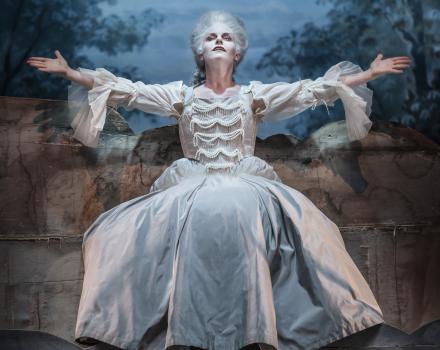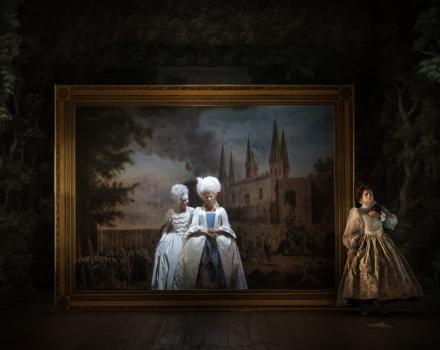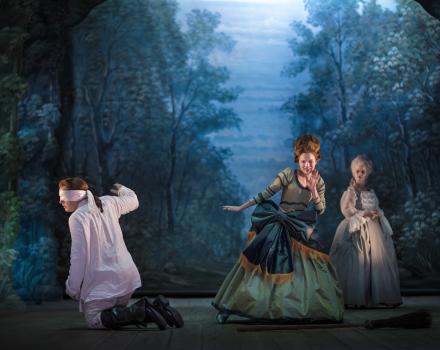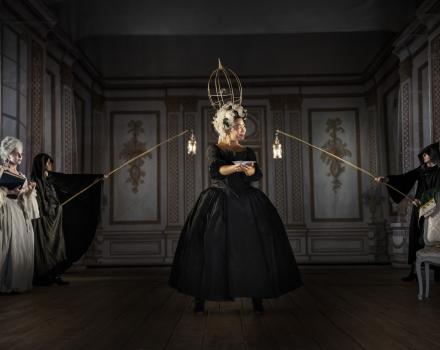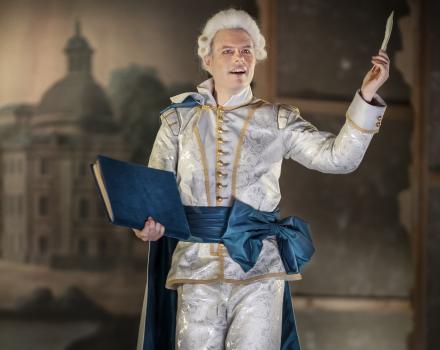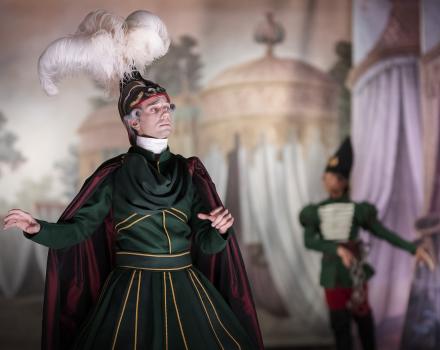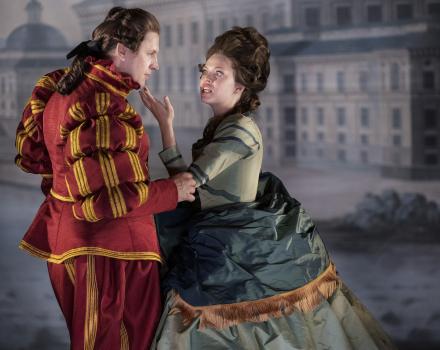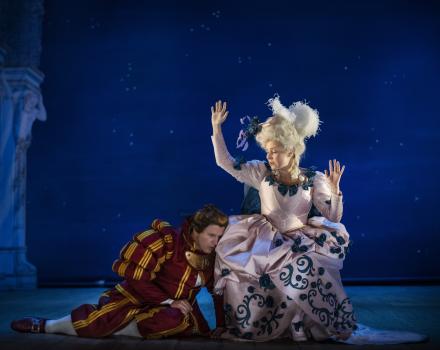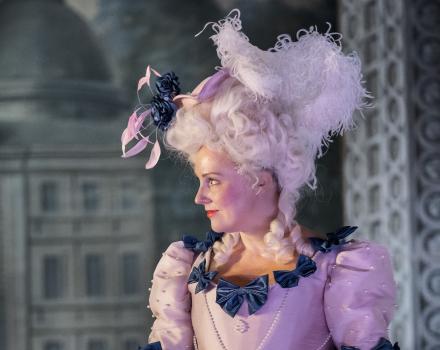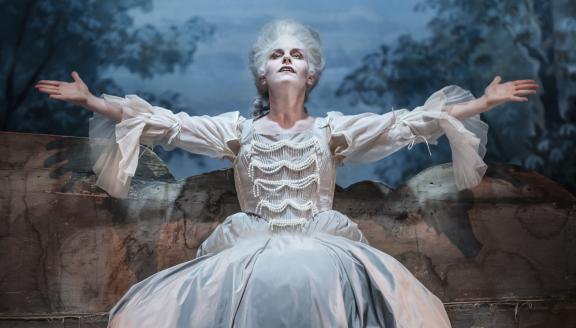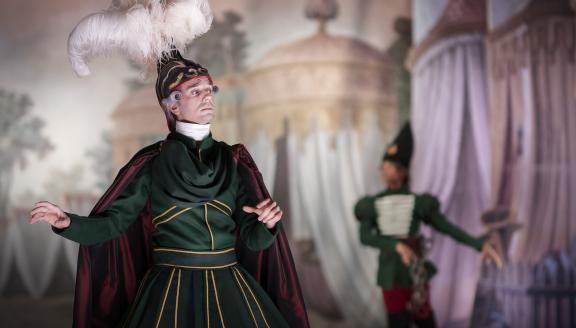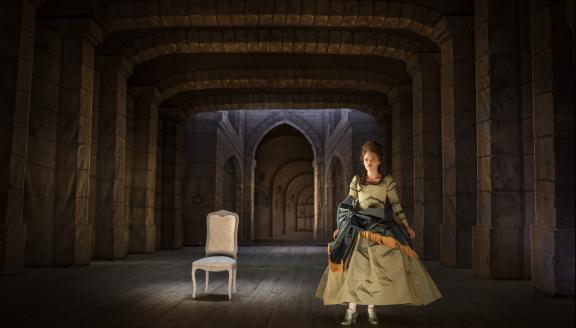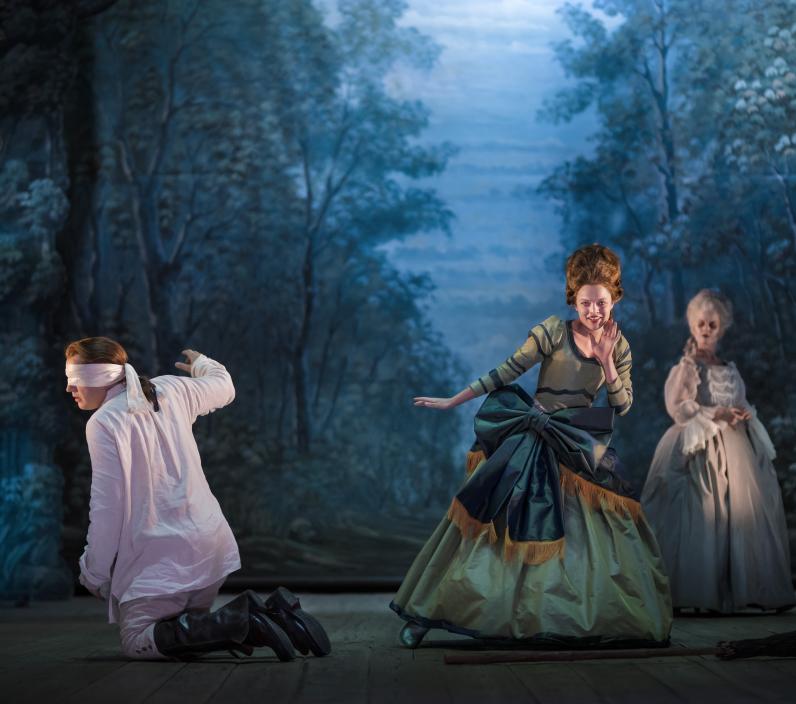
Il Giustino

Il Giustino relates the appearance of the goddess Fortune to the peasant Giustino, his rise to leadership of the Byzantine army and the defeat of a Scythian army under Vitaliano, and the jealousy of the emperor Anastasio, who suspects Giustino of having designs on his wife Arianna and on the throne itself. Will all the intrigues be foiled, the misunderstandings straightened out for a peasant to be proclaimed emperor?
Il Giustino was originally composed for the 1724 Rome carnevale by Antonio Vivaldi to a libretto by Nicolò Beregan. Vivaldi's score is full of picturesque detail; a sinfonia accompanying the descent of Fortune in a chariot emphasises the rustic nature of the setting by borrowing the refrain theme of the Spring concerto from his own Four Seasons. The final chorus, an extended chaconne, is the most elaborate piece of its kind in any Vivaldi opera. Staged for the first time in Sweden, Drottningholm’s production is directed for the stage and from the pit by George Petrou with Ukrainian countertenor Yuriy Mynenko in the title rôle. Drottningholms Slottsteater was built in 1766 and is the only theatre in the world that still uses original hand operated stage machinery. The theatre is listed as a UNESCO World Heritage Site at the Drottningholm Royal Court.
Cast
Anastasio | Raffaele Pe |
|---|---|
Arianna | Sofie Asplund |
Giustino | Yuriy Mynenko |
Leocasta | Johanna Wallroth |
Vitaliano | Juan Sancho |
Andronico | Linnea Andreassen |
Amanzio | Federico Fiorio |
Polidarte | Jihan Shin |
Fortuna, ghost | Elin Skorup |
Dancers | Stacey Aung Pontus Sundset |
Extras | Felix Hägg Ruben Lundström Mawlawi Rahem |
Orchestra | Drottningholm Theatre Orchestra |
| ... | |
Music | Antonio Vivaldi |
|---|---|
Text | Nicolò Beregan |
Conductor | George Petrou |
Director | George Petrou |
Sets & Costumes | Paris Mexis |
Lighting | Stella Kaltsou |
Choreography | Jenny Nilson |
Make-up & Wigs | Rebecka Andersson |
| ... | |
Videos
Story
ACT I
Workers are cleaning and preparing the stage of the court theatre. The king, fascinated by his theatre, likes to use this ‘room of illusion’ for pleasure, art, politics and everyday court life. As the king and queen pay tribute to each other, Amanzio, general of the royal troops, reminds the king of the ongoing war. Polidarte, an envoy from the enemy, bargains for peace if the king hands over his queen to their leader, Vitaliano. Enraged and provoked, the king prepares for war. The queen tries to persuade her husband to avoid putting his people and himself in danger. He dismisses her advice with a compliment.
Giustino, one of the stage workers, dreams of heroic glory. He falls asleep whilst cleaning the stage. The ghost of the theatre appears, promising him power and fortune. He is awakened by the screams of Leocasta, the prima donna of the theatre, as she is being assaulted. Giustino rushes to help. Leocasta finds him both endearing and good-looking and decides to introduce Giustino to the royal court.
Andronico, the brother of the enemy king Vitaliano, has disguised himself as a woman named ‘Flavia’ to get close to the lovely Leocasta, whom he spotted earlier on their diplomatic visit to the theatre. The king introduces Flavia to his queen as her new lady in waiting.
Throughout this commotion, the queen still feels lonely and caged by her sovereign status. Amanzio, who longs for power and title, tries to persuade the king to go to war. The king, however, does not like the idea of leaving his beloved theatre.
Giustino has meanwhile risen in the ranks and is now serving Leocasta and Flavia some tea. Leocasta convinces the king that the young hero should join the royal troops to help secure victory in the ongoing war. The disguised Andronico is jealous, as he realises that Leocasta is now in love with Giustino.
The king is inspired by the war to write the plot for a new opera. We witness the king’s opera being played out onstage as an imaginary Baroque theatre performance, telling the story of the enemy having captured his queen. Polidarte takes her to Vitaliano who tries to force her to return his love. Her persistent refusal leads him to order Polidarte to chain her up and feed her to a hungry monster. The queen sings a last farewell to her beloved king.
ACT II
The king sings of unhappiness and cries amidst the sound of raindrops. He finds existence in the theatre easier than that of the real world, happier in the fantastic realm of his new operatic creation.
The queen is about to be devoured by the monster when the hero Giustino appears and slays the savage beast. The king rushes into the drama as the saviour hero. The royal couple is reunited and sails home.
Vitaliano, regretting the death sentence he gave to the queen, has returned to the cave and finds the monster dead. With renewed hope, he sings of trying yet again to win the queen’s heart.
The imaginary performance has come to an end. Back in the 18th century court Anastasio is victorious. The queen proudly tells Leocasta and Flavia of Giustino’s heroic actions. Leocasta’s affection for Giustino leads her to grow jealous of the queen, as Andronico’s infatuation with Leocasta leads him to envy Giustino. Both Leocasta and Andronico strive to encounter Giustino first, to prevent the other from interfering with their own respective objects of desire. Andronico manages to leave first while Leocasta exhorts the queen to stay, enchanting her with a song about spring breezes. The queen becomes introspective as she sings about longing and unrequited love.
The king celebrates his victory. Giustino arrives with Vitaliano as a prisoner of war and climbs even higher in rank. Amanzio is consumed with envy. He plants the seeds of suspicion in the king’s mind, claiming that Giustino plots to usurp throne and queen. The tormented king tries to suppress these new-planted doubts and seeks the advice of a fortune teller. The card he picks is the omen of death which only increases his paranoia. When the queen innocently asks which rewards the king has planned for Giustino’s heroic deeds, the king finds even more reason to be jealous. He adorns her with Vitaliano’s royal jewels and urges her to be faithful to him. Once again, the queen is left alone to ponder Cupid’s strange ways.
Meanwhile, the disguised Andronico can’t restrain himself any further. He unmasks, revealing his true gender and confesses his intentions to Leocasta who is both upset and impressed. Once again, Giustino enters to rescue Leocasta. He arrests Andronico and sends him to the dungeon. Leocasta is smitten with Giustino. They confess their mutual love to each other. When Giustino is left alone, his lust for power and glory grows.
ACT III
Determined to climb even higher through the ranks, Giustino courts the lonely queen. As a reward for his courageous deeds, she adorns him with the ornament she received from her husband. Amanzio witnesses the scene and calls for the king. Giustino is condemned as a traitor and the queen humiliated. As Giustino bids farewell to Leocasta on his way to prison, she decides to save him.
Amanzio makes one last attempt to conquer Leocasta but is brutally dismissed. Drunk and becoming more and more delusional, Amanzio hopes to have himself crowned emperor. Meanwhile, Vitaliano and his brother Andronico escape from prison. On their way, they find the imprisoned Giustino sleeping and are just about to kill him, when the ghost appears again and reveals to them that he is in fact their long-lost brother.
Giustino persuades his newfound brothers to wreak revenge on the treacherous Amanzio and prove to the king that he was in fact slandered unjustly.
As the drunk and crazy Amanzio slips into the role of emperor, he is arrested by Giustino and his brothers. Giustino begs the king to forgive his brothers Vitaliano and Andronico. Upon hearing that Giustino is of noble blood, the king concedes and forgives his former enemies.
The king and queen are reconciled and a celebratory masked ball is arranged. Opera seria always calls for a lieto fine (happy ending). Indeed, everything seems to have worked out perfectly for everyone! Or has it?
Insights
Gustav and Giustino
by George Petrou, conductor and director
When I arrived at Drottningholms Slottsteater for the first time, I felt the history of the place overpowering me. The glory of the past is evident in every corner of this theatre. And above all, the spirit of King Gustav III, the ‘Theatre King’ as he is known in Sweden, is still omnipresent.
For King Gustav, the theatre at Drottningholm was a living space, where he would socialise, enjoy meals, accept diplomatic visitors, gossip about the political and social life of the world, but also attend rehearsals, decide on the repertoire, recite plays and get generally involved in what seemed to be the greatest love of his life: theatre and the arts.
Inspired by the sparkling personality of Gustav III, we ventured to put the action of our Giustino in Gustavian times and allow the Drottningholm theatre come alive again as a companion to the King’s everyday life.
Giustino, a peasant in the original libretto, becomes a lowly theatre servant who eventually attracts the attention of the King and rises to the highest ranks of the court officials. All 18th century Court elements are there: ambition, intrigue, vanity, love, sex, politics and lots of rococo lightness and humour, placed in this unique theatre-building which, as if possessing its own intelligence, works its magic in the lives of people.
We drew inspiration from certain historical facts around King Gustav III’s life and times: the relationship of the King with his wife, Queen Sofia Magdalena, the King’s ‘theatricality’ in his everyday life, his activities as play-writer and librettist, his seeking for advice form a fortune-teller in order to comfort his insecurities, and finally his tragic assassination. Through all this, we created an adventurous Baroque fantasy, in a fictional 18th c. court, allowing the Drottningholm theatre to be the real protagonist of the show. We turned the goddess Fortune of Beregan’s original libretto into the ‘theatre ghost’. Queen Lovisa Ulrika, the King’s mother and creator of the Drottningholm theatre, is the inspiration behind our ghost: a motherly figure but also very sharp in her relationship with her son and his wife. The ghost is watching over the theatre and the actions of our heroes, influencing in a surreal way the course of events.
The Drottningholm theatre offers a huge amount of different sets and a unique and very complex stage machinery. But the theatre auditorium itself forms a striking set in itself, being evidently present through the course of the performance. This cannot be ignored and it is indeed a great challenge to choose among those hand painted set elements of extreme beauty and creatively combine them, in order to evoke a magical atmosphere, underlining the storytelling in the best possible way. We aimed to recreate a theatre-within-theatre ambience, seeing the stage both as a meeting place, in a less glamorous state, (with stage works in action) as well as a Baroque performance venue, complete with candlelight effect lighting (Stella Kaltsou). The Gustavian inspired costumes by Paris Mexis aim to blend with the 18th century ambience of the sets, while under-lining the specific individualities of each character.
Gallery
